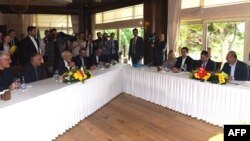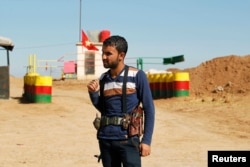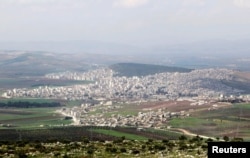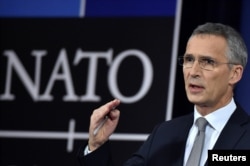Turkey’s Foreign Minister Melvin Cavusolgu is hosting his Russian and Iranian counterparts at the Mediterranean Sea resort of Antalya to prepare the ground for Wednesday’s summit in Russia to discuss Syria.
Despite Ankara backing opposing sides to Tehran and Moscow in the Syrian civil war, they have been increasingly cooperating to resolve the conflict. The three countries armed forces are deployed in creating a “de-escalation zone” in the Syrian enclave of Idlib, one of last strongholds of rebels fighting the Damascus regime.
Despite growing cooperation, the countries competing agendas are increasingly coming to the fore with the imminent defeat of Islamic State and rebel forces in the Syrian civil war. The meeting Sunday in Antalya is seeking to ease, if not resolve, those differences before the summit.
The hastily arranged summit came out of disputes over Moscow’s plan to hold a Syrian conference. Reportedly Tehran is unhappy at Moscow hosting the event, while Ankara was enraged over an invitation being extended to the Syrian Kurdish militia the PYD. Ankara accuses the militia of being linked to a Kurdish insurgency in Turkey.
But shared opposition to Washington’s policy in the region is providing a powerful impetus to ongoing cooperation between the three countries. “The 'zeitgeist' or spirit of times, forces the countries not to go into confrontation but cooperation,” said international relations professor Huseyin Balci of Ankara’s Middle East Technical University. The United States arming of PYD forces in their fight against the Islamic State continues to deeply strain relations with its NATO ally Turkey.
PYD controversy
U.S.-Turkish differences over the PYD, are increasingly dictating Turkish foreign policy. “At the moment all of Ankara’s priorities have been put in the Kurdish basket,” notes political columnist Semih Idiz of Al Monitor website, ”and that seems to be the guiding motive, whether its relations with Russia and also its relations with Iran.”
Cavusoglu is expected to press his Russian counterpart Sergei Lavrov during talks in Antalya to agree to allow Turkey to launch a military operation against the PYD forces in the Syrian Afrin enclave. Turkish President Recep Tayyip Erdogan, addressing party supporters Sunday, promised a military operation would be launched to “liberate” Afrin.
In the past few days, Turkey has been reinforcing its forces in the Syrian enclave of Idlib that borders Afrin. But with Russian soldiers deployed in Afrin, Moscow’s agreement to any attack is seen as crucial by Ankara.
Moscow is competing with Washington for influence over the Syrian Kurdish forces. “Russia has its own contacts to Kurdish politicians in the region,” observes Zaur Gasimov an Istanbul-based Russia-Turkey analyst for the Max Weber Foundation, “but [Moscow] is very concerned on pro-American mood among most Kurdish politicians.” Analysts suggest Russia may view the threat of Turkish military action as important leverage to persuade Syrian Kurds to realize Moscow, rather than Washington, is the most useful ally.
NATO relations
But Ankara’s courting of Moscow and Tehran is raising questions among its NATO partners. Turkish NATO relations received another blow, Friday, when Turkey withdrew its forces participating in a military drill in retaliation for slights made to Erdogan and the founder of the Turkish State Mustafa Kemal Ataturk, by other soldiers participating in the exercise.
The incident continues to reverberate in Turkey. Erdogan Sunday dismissed an apology by NATO Secretary-General Jens Stoltenberg describing its as “halfhearted.”
Reportedly Stoltenberg said those soldiers responsible for the slight had been dismissed. Anger against NATO is being whipped up in the Turkish media and has created a rare consensus in Turkey’s deeply polarized world.
Kemal Kilicdarolgu, leader of the main opposition CHP, joined in the condemnation of NATO. While Turkey’s Culture Minister Numan Kurtulmus described the incident as an example “anti-Islamic and anti-Turkey phobia.”
NATO and in particular the United States are viewed with deep suspicion among many Turks, and analysts point out such verbal attacks offer politicians an easy opportunity to score points with the electorate. With Turkey due to hold general and presidential elections by 2019, polls that are predicted to be close, the growing anti-Western nationalist rhetoric and policies are seen likely to continue. “Foreign policy in Turkey under the ruling AKP Party, it really has become an extension of domestic policy,” observes political columnist Idiz.
In such a political climate the NATO controversy could have far reaching effects, ”Turkey currently has more than one serious problem with the U.S., the locomotive force of NATO,” warned Murat Yetkin editor of Turkey’s Hurriyet Daily News, “these problems are causing a rift between the two countries, prompting both Americans and Turks to question the long-running alliance between their countries.”







